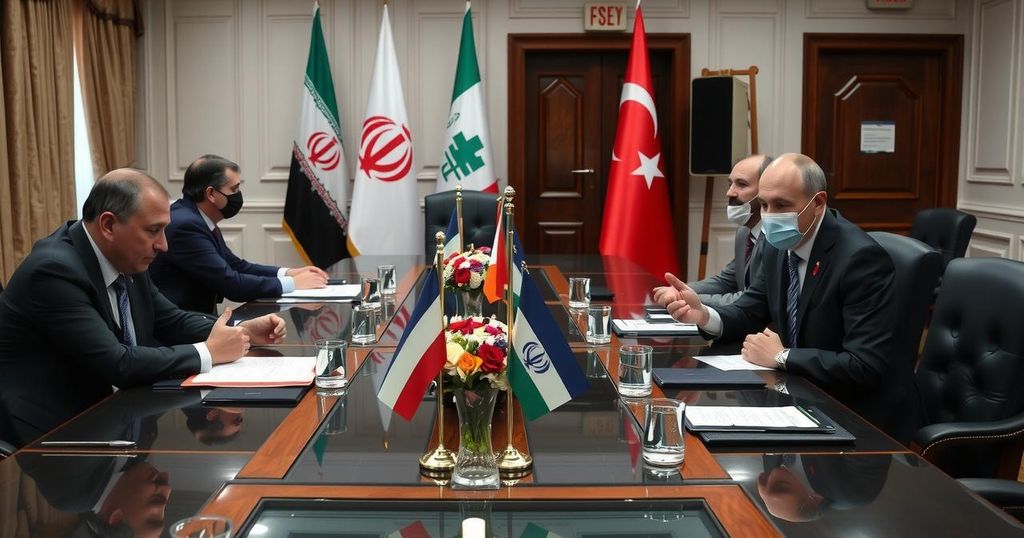Turkey, Russia, and Iran are scheduled to meet in Qatar to discuss recent rebel advances in Syria that have changed the conflict’s landscape. The meeting will occur at the Doha Forum and is part of the Astana process initiated to find political solutions to the civil war. The capture of cities by rebel forces has raised concerns about the future of the Assad regime and the implications for regional security, particularly regarding Kurdish forces. The U.S. remains engaged with military operations in the region, focusing on ISIS and the potential for renewed conflicts.
This weekend, Turkey, Russia, and Iran are set to convene in Qatar to address the recent aggressive actions taken by Islamist rebels that have shifted the dynamics of the Syrian civil conflict. This meeting will coincide with the Doha Forum, which serves as a platform for international discussion among prominent figures from over 150 nations. Turkey’s Foreign Minister Hakan Fidan is expected to engage with his Russian and Iranian counterparts in a meeting stemming from the Astana process, initiated in 2017 to foster political resolutions to the ongoing war.
The backdrop to this discussion is a significant offensives by the Hayat Tahrir al-Sham (HTS) rebel group, which has recently managed to capture key cities such as Aleppo and Hama, previously held by the Assad regime since the civil war began in 2011. Russian President Vladimir Putin and Turkish President Recep Tayyip Erdogan have communicated regarding the urgent need to cease aggression against the Syrian state while underlining the importance of political solutions from the Assad government.
Turkey’s longstanding concerns focus primarily on the implications of Kurdish groups in northeastern Syria, particularly as they relate to Turkey’s national security and the threat posed by the PKK, designated as a terrorist organization by the United States. Concurrently, clashes are ongoing between the Turkey-supported Syrian National Army and the U.S.-allied Syrian Democratic Forces (SDF).
Meanwhile, Russian involvement remains pivotal, but intensity has shifted due to their military operations in Ukraine, complicating their role in the Syrian theater. Iran, another crucial ally for Assad, is contending with challenges posed by Israeli operations against their proxies in surrounding regions. Some analysts express skepticism about the likelihood of Assad’s regime reaching a compromise under these pressures, while others contemplate the potential shifts in power dynamics, with the fall of Aleppo significantly impacting future support for Assad.
The presence of U.S. forces in Syria adds another layer to the conflict, particularly as military actions against ISIS continue. Reports highlight a recent Pentagon strike designed to protect U.S. personnel as tensions arise between the various factions involved. The current landscape suggests that the withdrawal of Syrian government forces from the central region may facilitate a resurgence of ISIS, raising alarms within the U.S. administration.
In summary, the forthcoming discussions between Turkey, Russia, and Iran will be crucial in determining the trajectory of the Syrian civil war amidst intensified rebel activity and changing international dynamics. Turkey’s critical stance towards Kurdish forces and the ongoing military engagements indicate that while immediate ceasefire prospects could emerge, long-term resolution remains complex and fraught with geopolitical implications.
The Syrian civil war began in 2011 and has involved multiple factions and international actors including Turkey, Russia, and Iran, among others. The conflict has seen a shift in power and territorial control, with the Assad regime, supported by Russia and Iran, struggling against various rebel groups including the U.S.-backed SDF. The Astana process, initiated in 2017, was designed to establish a framework for reducing violence and seeking a political resolution to the conflict. Recent developments, particularly an offensive by HTS, have altered the situation dramatically, prompting urgent discussions among key stakeholders. Additionally, the geopolitical interests of Turkey, Russia, and Iran converge in complex ways, influenced by their respective regional ambitions and security concerns, particularly relating to Kurdish autonomy and the fight against ISIS.
In conclusion, the upcoming tripartite meeting between Turkey, Russia, and Iran signifies a pivotal moment in the Syrian civil war, characterized by recent advances by HTS rebels and the continuing regional implications of the conflict. The meeting aims to tackle the current crisis while reinforcing the necessity for a political resolution to stabilize the country. However, underlying tensions surrounding Kurdish forces, the fate of the Assad regime, and the potential resurgence of ISIS introduce significant challenges. The dynamics of the Syrian conflict underscore the complex interplay of local and international interests.
Original Source: www.voanews.com






